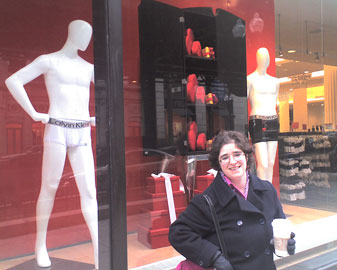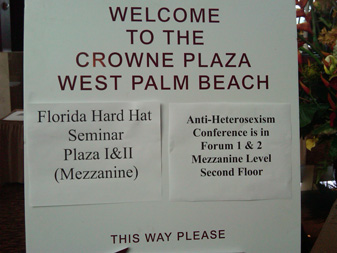The second day of the Soulforce conference began with a keynote speech from Dr. Sylvia Rhue, the director of religious affairs for the National Black Justice Coalition. NBJC is the only nationwide advocacy group for GLBT African-Americans. Their mission, she said, is to show that homophobia in the black church is an artifact of politics and should not be an article of faith. Dr. Rhue gave us an overview of ex-gay myths and their lack of scientific basis. She was largely unwilling to credit the religious right with a sincere desire to help gays. More likely, she said, offering to help gays “change” was a way to put a compassionate face on prejudice (while making big bucks off of gays’ self-hatred). It’s better PR than preaching fire and brimstone.
Dr. Rhue was one of several speakers to connect heterosexism to racism. The misinterpretation of the Sodom story is like the “curse of Ham” formerly used to justify slavery. (She mentioned a parody of an ex-gay ad at the Landover Baptist humor website: “We stand for the truth that Negroes can change: Example, Clarence Thomas!”) African-Americans have also tried to “change” in a racist society by passing for white.
Dr. Rhue called the ex-gay movement blasphemy because it makes people doubt that they are God’s children. “The ex-gay movement is the cult of the annihilation of the authentic self.” She would not let people hide their lack of empathy behind so-called Biblical dictates: “The Bible can justify whatever kindness or cruelty you already have in your heart.”
After the keynote speech, we broke up into smaller groups for different workshops. I attended Dr. Dominic Carbone’s presentation on the effects of childhood homophobic stress on adult gay men, because it was useful research for my novel. Dr. Carbone is a secular psychologist in New York City. He became interested in the topic because his patients often spoke about formative childhood experiences of peer ridicule, which caused them to experience depression, anxiety, and problems with intimacy as adults.
Being closeted prevents boys from developing a support network to explore new social skills and roles. Internalized homophobia is carried forward into adulthood because identity was formed from a powerless and stealth position, so the person feels defeated before he even begins. Dr. Carbone uses cognitive therapy to help such men replace their internalized unfriendly audience with awareness of their sources of support in the present. Interestingly, he mentioned one patient who was not gay but suffered the same after-effects from homophobic teasing because he wasn’t stereotypically masculine as a child. I think more stories like this could help us make the case that a world free of gender bias benefits people of all sexual orientations.
Jim Burroway of Box Turtle Bulletin gave a sardonic and informative presentation titled “Heterosexual Interrupted: What the Ex-Gay Movement Really Means by ‘Change'”. Jim is an engineer who works for defense contractors. He analyzed the junk science in papers by ex-gay advocates like Paul Cameron and was able to figure out that they were misrepresenting the studies they cited.
Jim gave us a detailed breakdown of the manipulative psychology behind ex-gay outreach. For the struggling closeted person who just wants to feel normal, ex-gay ministries offer an explanation of their feelings of alienation and suffering, and a promise of liberation. Unfortunately, once you’re inside the movement, you find out that there really is no way to become straight. The most you can hope for is a lifetime of self-denial, rewarded with salvation at the end.
Their so-called explanations of homosexuality–such as NARTH founder Joseph Nicolosi’s theory that gay men are looking to fill an unmet need for closeness with their father–are insidiously believable because they do reflect gay youths’ experience of personal shame, insecure identity, and troubled relationships with parents. However, in reality, these problems spring from bias, not from the same-sex attraction as such. The “therapy” compounds the shame and rejection.
Jim played sound clips from ex-gay ads and conferences. “We advise fathers, if you don’t hug your sons, some other man will,” Nicolosi says ominously. This scaremongering drives a wedge between gay sons and their embarrassed fathers, and also feeds the stereotype of gays as pedophiles. Similarly, Melissa Fryrear of Exodus and Focus on the Family argues that all lesbians are sexual abuse victims. Well, said Jim, the sad truth is that a large number of all women have been sexually abused. This theory causes grief to parents who had no reason to believe their daughters were molested. Existing tensions about homosexuality are exploited to control and divide families, and incidentally, take their money.
Jim got some laughs out of Love In Action director John Smid’s assertion that “My wife’s vagina is enough for me–God created it for my fit.” (No word on whether the feeling is reciprocal…paging Eve Ensler…) Jim’s serious point was that ex-gay ideology not only severs body from spirit in gay men, but also reduces women to sexual parts and objectifies them. It’s no coincidence that “heterosexism” contains the word “sexism”.
Next, Prof. Christine Robinson, a sociology professor at James Madison University in Virginia, presented an excellent paper on “Genocidal Intentions: Public Policy and the Ex-Gay Movement”. She convinced me that the word “genocide” was not hyperbole. According to the UN Convention on Genocide, the term applies to a variety of strategies intended to wipe out an identifiable social subgroup. In addition to outright killing, genocide includes:
*Causing serious bodily or mental harm to members of the group;
*Deliberately inflicting on the group conditions of life calculated to bring about its physical destruction in whole or in part;
*Imposing measures intended to prevent births within the group;
*Forcibly transferring children of the group to another group.
It’s clear from conservative religious rhetoric that they do want to make gays disappear. Exodus board member Don Schmierer, one of the forces behind Uganda’s Anti-Homosexuality Bill, has written a book on “preventing the homosexual condition” in youth. In 2007, Southern Baptist leader Albert Mohler said he would support treatment to eliminate homosexual orientation prenatally if a mechanism were found. (Apparently anti-gay trumps pro-life.) Ex-gay ministries provide legal aid and supportive research in custody cases to take children away from gay parents. (Prof. Robinson cited the Lisa Miller case.) These religious groups have also worked to pass state laws that ban gay adoption and IVF. They filed amicus briefs opposing the decriminalization of sodomy by the Supreme Court in Lawrence v. Texas in 2003. Exodus Global Alliance recently sponsored a conference in Barbados, where gay sex is illegal, with the advertisement “Some say decriminalize homosexuality–we say let’s offer solutions.” Would those be…final solutions?
Prof. Robinson applied social psychologist James Waller’s framework for understanding how ordinary people become capable of genocide. Through propaganda, they learn to recharacterize members of the targeted group as inferior, and to redefine acts of cruelty as something less heinous. The target becomes constructed as “other” through us-them thinking, moral disengagement, and blaming the victim. Perpetrators engage in social distancing from the other group to define them as non-persons.
How do anti-gay religious leaders accomplish this? They divide the world into Christians and non-Christians, and gays can’t be Christian. It’s God who makes these distinctions, not us, they say. (Just following orders…) Social distancing occurs by redefining the object of their hostility. There are no gay people so there are no victims. We are only wiping out this thing called “homosexuality”, not homosexuals themselves. In fact, we’re offering them freedom from their sin! Exodus leader Alan Chambers likes to say “the opposite of homosexuality is holiness”. This is a euphemistic way of saying that homosexuality is evil, which he will say outright to more insider Christian audiences.
Victim-blaming kicks in when ex-gay ministries point to self-harming behavior in the gay community, such as unsafe sex, instead of acknowledging the traumatic effects of social stigma on this population. They even say that hate crimes are provoked by predatory sexual advances. When the federal hate crimes bill was being debated this spring, conservative opponents blamed Mathew Shepard for his own murder.
Prof. Robinson is currently researching how conservative Christian organizations export homophobia to the developing world. This issue has gotten more press lately with the release of Jeff Sharlet’s book on The Family, a conservative theocratic cabal that claims some top US politicians as members. Read more on Andrew Sullivan’s blog.
Saturday’s last presentation was given by Dr. Jack Drescher, a psychiatrist and widely published author, who surveyed the history of psychological theories on homosexuality and how it was finally removed from the DSM-IV’s list of mental disorders in 1973. NARTH was formed as a protest against that decision. Like “creation science” versus Darwinism, anti-gay ministries use junk science to create a false appearance of disagreement among scientific experts so they can demand equal time. But there are no accredited psychiatric programs where students are being taught how to change their patients’ sexual orientation. All the leading professional groups have rejected this therapy as ineffective at best, harmful at worst.
Drescher suggested that ex-gay therapy may violate the ethical directive to put patients’ best interests ahead of the counselor’s agenda. There is a conflict of interest because the counselor is an agent of a conservative political or religious organization. It’s a common practice for ex-gay therapists to coerce their clients to stay in the program, by threatening to “out” them to their family, school or church. If they give up on the goal of sexual orientation change, they are kicked out of therapy with no referral.
While ex-gay groups claim they are defending the patient’s right to choose reparative therapy, a doctor is not obliged to provide something harmful just because a patient requests it. Doctors are not allowed to prescribe snake oil. Plastic surgeons treat conditions that are not illnesses, but there’s a very complex scientific review process; patients can’t simply choose any surgery they want.
However, Drescher noted that former ex-gay patients rarely file ethics complaints. They blame themselves, believing that the therapist genuinely wanted to help them, or they are reluctant to relive the trauma. One resource he recommended was the Association of Gay and Lesbian Psychiatrists.
After the dinner break, we were treated to “M.U.D. (Men Under Dirt)”, a memorable and heart-stirring multimedia performance by John Ollom and the members of Ollom Movement Art. Through interpretive dance, a short film, and poetry by Walt Whitman, the troupe told the story of a gay man’s struggle to love his true self and make peace with the masculine and feminine energies within him. Find out more, and see a trailer for the film, at their Prismatic Productions website. John will be leading a workshop on self-expression through poetry, drawing, film, and dance at Easton Mountain in upstate New York this coming June.
Coming in my next post: Sunday’s presentations by Rev. Deborah Johnson and Candace Chellew-Hodge, and thoughts for the future.


